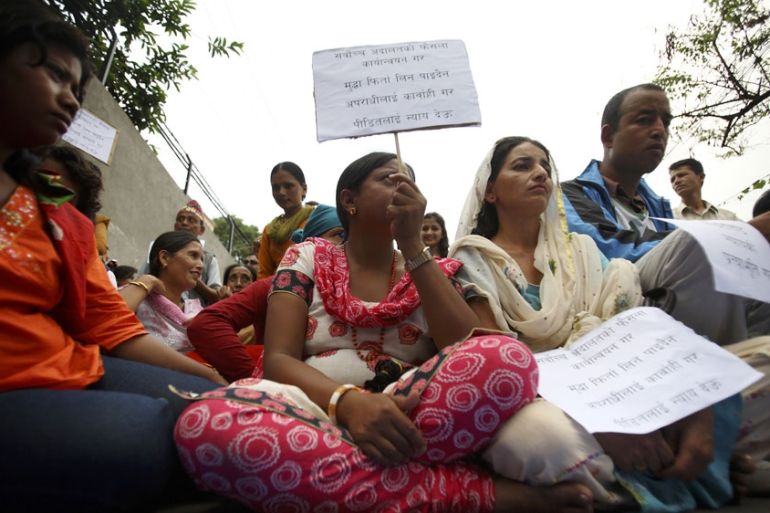Nepal transitional justice making little progress: Rights groups
Rights groups criticise slow pace of transitional justice in Nepal and partisan nature of truth commission appointments.

Thirteen years after a peace agreement was signed between the Maoist rebels and the Nepali government, ending the decade-old civil war, little progress has been made on the question of transitional justice, rights organisations say.
No real progress has been made on questions of justice, truth, and reparations for victims, the International Commission of Jurists (ICJ), Amnesty International, Human Rights Watch (HRW) and TRIAL International said last month.
Keep reading
list of 3 itemsAfter a year of elections, Nepal moves closer to China
Nepal parliament speaker arrested over rape allegations
More than 16,000 people were killed and nearly 1,400 disappeared – mostly at the hands of security forces – during the civil war, which ended after the Comprehensive Peace Agreement was signed on November 21, 2006.
Two transitional bodies, the Truth and Reconciliation Commission and the Commission of Investigation on Enforced Disappeared Persons, were created in 2015 to address the atrocities committed during the conflict.
But the four groups say the truth commissions have not made sufficient progress and that the impunity of perpetrators of human rights violations during the conflict prevails.
‘Political appointments’
The many thousands of complaints brought by victims and their families have not been addressed and no findings have been published by the commissions yet, the statement said.
There is no witness protection policy. It is clearly a perpetrator-led process that serves the interests of the perpetrators not the victims
It is not the first time rights groups are concerned with the slow progress. In February, Amnesty, the ICJ and TRIAL jointly called for the government of Nepal to commit to a transparent and consultative transitional justice process.
Successive governments have been accused of filling the Truth and Reconciliation Commission with political appointments. Currently the body is not operational because it is waiting for a new commissioner to be appointed.
AL Jazeera contacted the Truth and Reconciliation Commission in Nepal but it declined to comment.
The former Maoist rebels, who later merged their party into the moderate Communist Party of Nepal (CPN-UML) to form the Nepal Communist Party, are currently part of the ruling coalition.
“It is deeply disappointing that the government has repeatedly attempted to appoint the commissioners without adequate consultation and transparency,” said Biraj Patnaik, South Asia director at Amnesty.
“The commissions will not gain the trust of victims and the international community if the political parties continue to interfere in the appointment process.”
The process has been stalled since the 2014 amendment to the Transitional Justice Act, which granted amnesty to those suspected of human rights violations, was declared unconstitutional by the Supreme Court a year later.
In its judgement the Supreme Court stated that the provision of amnesty was not consistent with international standards.
‘A perpetrator-led process’
Ram Bhandari, a Nepalese activist whose father was one of the “disappeared”, said that the historic 2015 court verdict has “clearly been ignored” by authorities.
“The amnesty flies in the face of international human rights law, which recognises no amnesty for non-derogable human rights norms such as torture, extra-judicial killings and enforced disappearances,” said Tomas Anania, programme manager for Nepal at TRIAL.
Meenakshi Ganguly, South Asia director of Human Rights Watch, said “the international community should remind Nepal that whitewashing egregious crimes will not help dodge universal jurisdiction”.
Ganguly said no prosecutions have taken place since the truth commissions were formed. “There is no political will of any sort to bring the cases forward.”
Bhandari called the process “fake”. “Activists still receive threats not to speak against perpetrators and against those who directly obstructed the commissions’ investigations.”
“There is no witness protection policy. It is clearly a perpetrator-led process that serves the interests of the perpetrators not the victims,” he told Al Jazeera.